God of War Ragnarok game director on the importance of the opening hours
And the evolving relationship between Kratos and Atreus
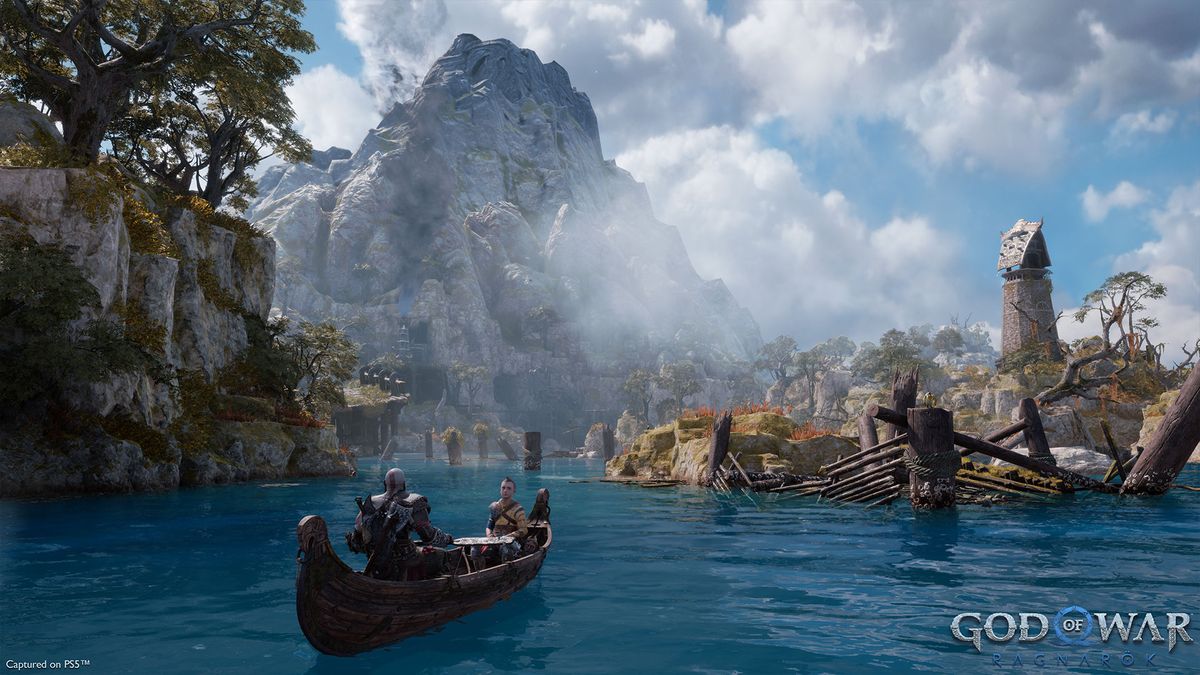
Eric Williams, the new game director for God of War Ragnarok, may not have wanted the spotlight, but it's clear he's the man to lead this sequel. Having worked closely with Cory Barlog and the Sony Santa Monica team on the God of War series since 2004, he's a seriously passionate guy about Kratos and co., and from everything I've played so far, this sequel is going to be quite the second album – with not even a whiff of the word "difficult" in sight.
So we sat down with Williams to talk about the opening hours of Kratos and Atreus's latest adventure with Mimir, Tyr, and no doubt others, and talked about changing relationships, returning mechanics, and evolving combat.
GamesRadar: There are a lot of parallels between the opening of this game and the opening of the last game, between narrative beats and the emotional load. Was that deliberate?
Eric Williams: Yeah. The long-standing arc for the franchise has always been this cycle of fathers and sons. And at the end of the last game, we have Kratos saying, "We have to break the cycle. The cycle ends here." And we like that, right? It's like, okay, we'll put an end to that, but not all things do end. Like there are other things that maybe because you're so focused on the big thing, you don't see the little things that are happening. So these kinds of more emotional ideas of grief, remorse, and regret – they're also cycles. And if you're not careful, they're the ones that will really hold you back.
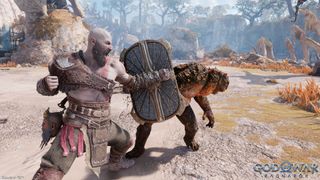
Read our full God of War Ragnarok gameplay preview of the opening hours of the game
So we're trying to make those be a little bit more apparent to them or that they have to deal with them. That gets deep into the intimate side of the storytelling. We have to have this epic backdrop – it's Norse mythology – but you also can't lose the heart, which was the rebuilding foundation, right? How do we make Kratos mortal again? How do you teach a boy to be a God? And in this game, it's like, okay, they're getting there, they're doing better, but what happens if they're not around each other? What if the kid's out on his own doing some stuff? And if Kratos doesn't have his kid, does he slip into his old ways? What will happen if you have people trying to split them up and break them up or even of their own accord? If you hold on your child too tight, do they run away?
So these are the kind of ideas that we tried to play with, while balancing this giant, epic Norse mythology. So it's quite the balancing act.
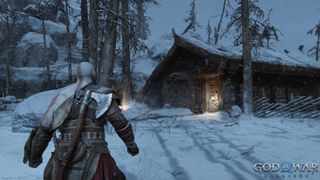
GR: How do you approach trying to find that balance between that family level storytelling and epic Norse mythology?
Sign up to the 12DOVE Newsletter
Weekly digests, tales from the communities you love, and more
Williams: Good question, because I don't even know if we know how to articulate it. It's more of a feel… What is very important to me is that we are honest with the storytelling and not try to manufacture things.
We always try to be very honest about the moments, and I think that's why we can balance it. Honesty is where we always try to come from, like that human element, and what you feel in the scene.
GR: Even just from these opening hours, it feels like there's so much nuance even in just the little moments outside of the core storyline. You can just see that Kratos is still trying to know how to be a father, and Atreus is much older, more rebellious, and obviously knows his mind a lot more in this game.
Williams: The interesting thing about this story is that it's a father-son story, a parent-child story. But it also has a lot of found family in it as well, you know. It's the family that you choose versus the family you're born into.
That's the key to this game. The last game you had Atreus just always being told what to do by adults. Anybody asks a question and they never give him an answer. But we wanted to be a lot more grey. Now we're getting into Atreus being like, "Well, I don't think it's like that". And [Kratos and Mimir] are like, "Oh, are you being sassy? Or should we actually have a real conversation about this?"
As you continue to play, you'll probably see that start to blossom a lot more. Kratos doesn't just tell him "Don't say that". That's what he would have told him last time – "Boy, don't speak like that."
And I don't know if you have noticed, but Kratos hasn't called him "Boy" at all?
GR: I was waiting for it! Because it's become such a thing about the game, right? But I guess it's because he's not a boy really anymore…
Williams: He calls him Atreus.
It's that idea that we really wanted it to be this feeling of like 'oh, I can find a way into this story, whether I'm a parent or a child, or I'm somewhere in between, or I remember both sides of it'. There's a way in for everyone.
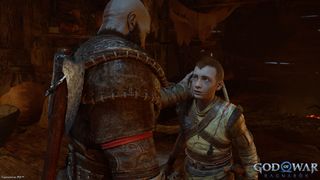
GR: I also love the fact that Mimir feels more like a surrogate parent in this game. He used to be the jovial storyteller, but here he's more of a guiding presence, and he has his own stories and secrets that people are finding out about him now.
Williams: Yeah, there's that little walk right before they leave Midgard. And he says, "Oh, a word, brother". And he goes, "You know, you can hold on too tight. He's gonna go" [in regards to Atreus]. He never would have spoken to Kratos that way last time. That little bit right there just shows how much they respect each other – there's a bond. He doesn't call him Head anymore!
I think that's what's really interesting – you don't have to do this big exposition, you just have that little moment to realise things are different. They're on par. To Kratos he's a confidant, to Atreus he's another parental figure. We really took the idea that it takes a village, because Kratos can't answer a lot of the questions that are being asked of him. He's not a giant. He doesn't know that part [of Atreus]. So those parts Kratos struggles with. And I love those parts that Kratos struggles with because he can't beat them up.
Kratos is also a jerk, he's done terrible things and you can't let that go right? We're very mindful that we're not looking for a redemption story
Eric Willaims, Game Director
GR: You can't really beat up a secret.
Williams: Exactly. And that's the stuff that's beautiful about the storytelling that's happening in these Norse games, because we've faced challenges where he can't fight with his fists, and I think that's where you get the real internal thinking. I've been with the franchise since 2004 and I've always maintained this idea that he is always thinking, but his rage gets the best of him.
I think those old games kinda get a bad rap, but if you look at the decisions he makes, he's clear, and then he goes and does it… It's just now that obsession is now placed onto his kid, that he'll protect at all costs.
And that's what I think is awesome about character development. Kratos is also a jerk, he's done terrible things and you can't let that go right? We're very mindful that we're not looking for a redemption story, but all we're looking for is whether someone can get back to some kind of status quo. Can he leave the world a little better than he found it?
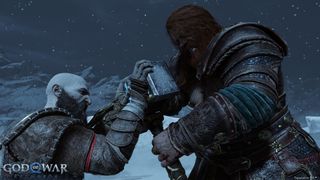
GR: He's so keen, like you said earlier, to break that cycle and not be that same person. So it's interesting when Tyr then joins the group and he's someone who also no longer wants to be a God of war, whereas it feels like Atreus does. So it's the two of them versus this kid who doesn't really know who he is, who has his own secrets and his own questions.
Williams: Yeah, because Atreus thinks it's going to be great but then he's kinda let down. He's like "Oh no, this guy sides with dad and Mimir? Oh no, now it's three against one".
Never meet your heroes, right? So yeah, we keep spinning those threads and if you're into it now, I think you'll continue to be so.
GR: How difficult was it to re-establish them as the characters that we know and love from the first game, but older and changed? You're coming to them several years after the last game and it just seems like it's been the three of them on their own for a really long time.
Williams: It's really tough. That pacing of what we call the "first hour" [which is actually around 2-3 hours into the game], I mean there's so much we need to do there. It's jam-packed. And for a long time, the pacing wasn't quite there and the team was freaking out.
We know that they're working better together because you see Kratos put his arm around Atreus, and Mimir's a buddy now. But, Kratos is still dealing with the fact that Faye lied to him. That's a really big part of the story – that this person he put all the trust in the world into lied to him. And now he's lying to the kid, so he's doing the same thing – because he doesn't tell him about the mural at the end of the last game [where it seemed to show Atreus betraying Kratos].
So yeah, it was very very difficult and we struggled with it for quite some time. But we also have a history of making a very good first hour, like, that's always been a hallmark of a series. we feel you should get your money's worth in the first hour. And then the rest is gravy. So we always put a lot into that first hour, and I think from your expression, I think we did a good job.
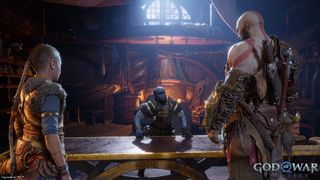
GR: Was it tempting to step away from some of the returning elements, like the Nornir chests and the Ravens for example?
Williams: I think for me, because I helped build so much of that design element in the first game, we weren't going to just get rid of it, so we're going to do some twists on it and work it into the story a little bit more. The ravens, for instance, I think you're going to be surprised when you see that it has its own story with its own culmination at the end of the game. Even the Nornir chests, we talk about those in a bit of a different way to think about how and why they're placed where they are. And we try to acknowledge it all so it all makes sense within the world. But at the same time, we've got completely new stuff as well, so I think it works, there's no reason to get rid of it.
Now, some people don't like that because they think it's not an evolution. Well, sequels are not always going to be as major a step, they're going to be refined, and they're going to be a continuation – especially in the story space. It would have taken us forever to rebuild the whole game and then take on that story. If you liked [the reboot] we'll give you that [again, but] we're going to do a lot more refining.
The combat is highly refined, with the new triangle button moves and the way that works, and you get the blades and the axe so quickly into the game. There's a lot going on real fast, and it gives you time to start to express Kratos in a different way. Like if I want to be a tank Kratos, or a Magic or status affect Kratos… you can make those choices now. Last game, it was there, but it wasn't as accessible to make a whole build that goes one way or another. That's the stuff we were more focused on.
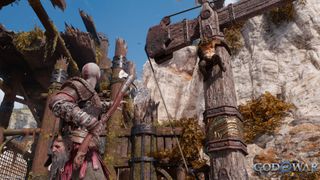
GR: Having the blades so early on completely changes the way you think about combat, but also the systems for upgrading and weapons feel a lot more streamlined this time around.
Williams: Yeah, that's what we always find a bummer is that we'll spend so much time building new systems, and then like 10% of the players engage with them, so we were like we've got to do better. The Kratos motto is the team's motto. Anytime we see something is not where it's supposed to be, it's like, be better. That's it, there's no argument about it, just be better. Especially with accessibility as a whole. So it wasn't like, oh, we'll take a couple of times to get up to Naughty Dog's standard. No, we're just going in and smash them one-for-one right now with this game. We're part of the first-party studio systems, we have to lead the way. [Naughty Dog] put down the first flag, and we need to go right behind them.
God of War Ragnarok slams onto PS5 and PS4 on November 9, and still remains one of the most anticipated upcoming PS5 games.

Sam Loveridge is the Global Editor-in-Chief of GamesRadar, and joined the team in August 2017. Sam came to GamesRadar after working at TrustedReviews, Digital Spy, and Fandom, following the completion of an MA in Journalism. In her time, she's also had appearances on The Guardian, BBC, and more. Her experience has seen her cover console and PC games, along with gaming hardware, for a decade, and for GamesRadar, she's in charge of the site's overall direction, managing the team, and making sure it's the best it can be. Her gaming passions lie with weird simulation games, big open-world RPGs, and beautifully crafted indies. She plays across all platforms, and specializes in titles like Pokemon, Assassin's Creed, The Sims, and more. Basically, she loves all games that aren't sports or fighting titles! In her spare time, Sam likes to live like Stardew Valley by cooking and baking, growing vegetables, and enjoying life in the countryside.
Most Popular


